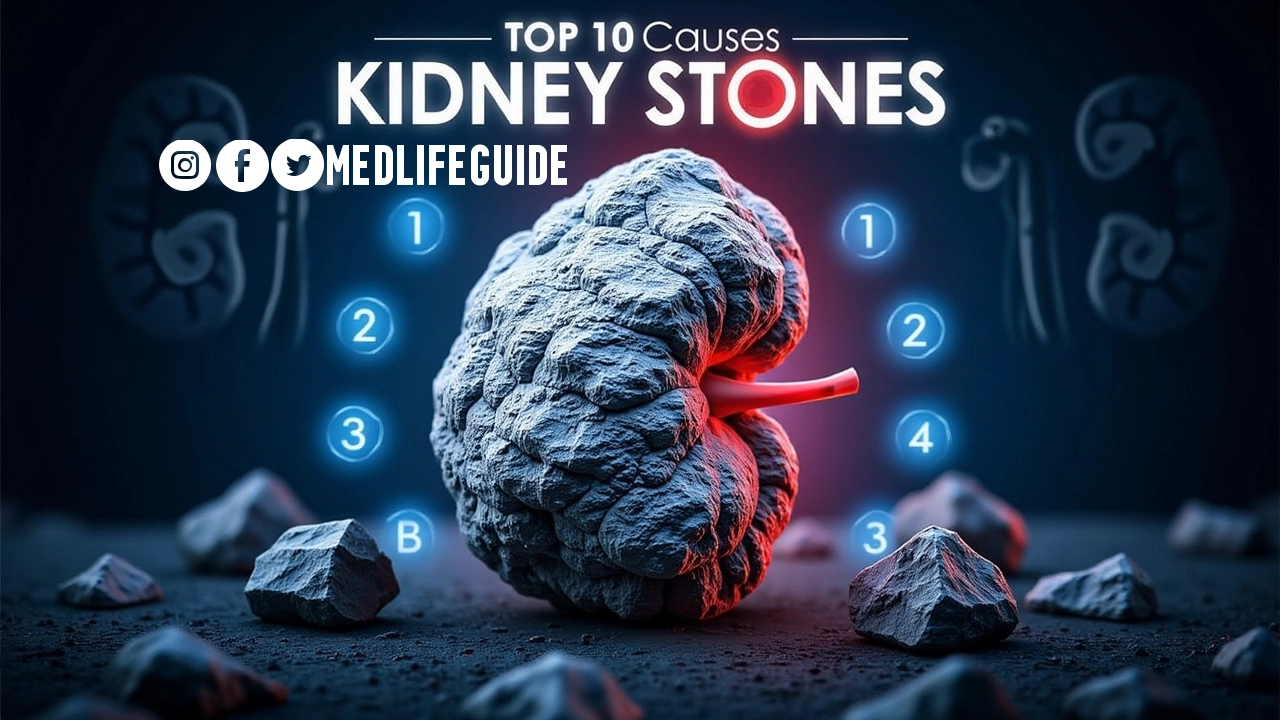Kidney stones are a painful condition affecting millions worldwide. Understanding the top ten causes can help prevent their formation.
- Dehydration: Insufficient water intake concentrate
Kidney stones are a painful condition affecting millions worldwide. Understanding the top ten causes can help prevent their formation.
- Dehydration: Insufficient water intake concentrates urine, increasing the likelihood of stone formation. Drinking adequate fluids daily can dilute substances that lead to stones.
- Dietary Factors: High sodium intake can cause calcium retention in the kidneys, leading to stones. A diet rich in oxalate, found in foods like spinach and nuts, can also contribute to stone development.
- Obesity: Excess body weight is linked to higher levels of uric acid and calcium in the urine, both of which can lead to stone formation. Maintaining a healthy weight through diet and exercise can reduce this risk.
- Family History: Genetics play a significant role in kidney stone formation. If family members have experienced stones, the risk increases. Understanding this hereditary link can encourage preventive measures.
- Certain Medical Conditions: Conditions like diabetes, gout, and hyperparathyroidism can elevate stone risk. Managing these health issues through medical guidance is essential for prevention.
- Medications: Some medications, including diuretics and calcium-based antacids, can increase the likelihood of stones. Consulting with a healthcare provider about alternatives can help mitigate this risk.
- Low Calcium Intake: Surprisingly, not consuming enough calcium can lead to higher oxalate levels in the urine, increasing stone risk. A balanced intake of calcium-rich foods is crucial for kidney health.
- High Protein Diets: Diets rich in animal proteins can increase uric acid levels and lower citrate levels, a substance that helps prevent stones. Moderating protein intake can be beneficial for kidney health.
- Digestive Disorders: Conditions like inflammatory bowel disease can affect nutrient absorption, leading to increased stone formation. Managing digestive health is vital for overall kidney function.
- Chronic Dehydration: Long-term insufficient fluid intake can lead to chronic kidney issues, including stone formation. Establishing a routine of regular hydration can significantly reduce this risk.
Awareness of these causes can empower individuals to make informed lifestyle choices, potentially preventing the painful experience of kidney stones. Regular check-ups with healthcare providers can also aid in monitoring kidney health and addressing any concerns early.
How to Prevent Kidney Stones
Preventing kidney stones involves a combination of dietary changes, hydration, and lifestyle adjustments. Here are key strategies to help reduce the risk of developing these painful stones.
First and foremost, hydration is crucial. Drinking plenty of water helps dilute substances in urine that can lead to stones. Aim for at least 2 to 3 liters of water daily. This is especially important in hot weather or during exercise when fluid loss increases. A simple way to monitor hydration is by checking urine color; pale yellow indicates good hydration, while dark yellow suggests a need for more fluids.
Diet plays a significant role in kidney stone prevention. Reducing sodium intake is essential. High sodium levels can increase calcium in urine, leading to stone formation. Aim for less than 2,300 milligrams of sodium per day. This means being mindful of processed foods, which often contain hidden salts. Instead, focus on fresh fruits and vegetables, which are naturally low in sodium.
Calcium is another critical factor. While it might seem counterintuitive, adequate calcium intake can actually help prevent stones. Low calcium diets can increase oxalate levels in urine, a common stone-forming substance. Incorporate calcium-rich foods like dairy products, leafy greens, and fortified plant-based milks into the diet. However, avoid excessive calcium supplements unless directed by a healthcare provider.
Oxalate is a compound found in many foods that can contribute to kidney stones, particularly calcium oxalate stones. Reducing high-oxalate foods can be beneficial. Foods such as spinach, rhubarb, beets, nuts, and chocolate are high in oxalates. Moderation is key; rather than eliminating these foods entirely, balance them with low-oxalate options like bananas, cauliflower, and whole grains.
Another dietary consideration is protein intake. High animal protein consumption can increase uric acid levels and lower citrate levels in urine, both of which can lead to stone formation. Limiting red meat, poultry, and fish can help. Instead, consider plant-based protein sources like beans, lentils, and tofu, which provide necessary nutrients without the added risk.
Citrus fruits can be beneficial in preventing kidney stones. They contain citric acid, which can help inhibit stone formation. Incorporating lemons, limes, and oranges into the diet can increase citrate levels in urine. Drinking lemonade or limeade made with real fruit juice can be a refreshing way to boost citric acid intake.
Maintaining a healthy weight is also important. Obesity is linked to an increased risk of kidney stones. Engaging in regular physical activity can help manage weight and reduce stone risk. Aim for at least 150 minutes of moderate aerobic activity each week, along with strength training exercises twice a week.
Monitoring medications is crucial as well. Certain medications can contribute to stone formation. If there’s a history of kidney stones, discussing medication options with a healthcare provider is advisable. They may suggest alternatives or additional treatments to help prevent stones.
For those with a history of kidney stones, regular check-ups with a healthcare provider can help monitor kidney health and prevent future stones. A healthcare provider may recommend urine tests to analyze stone composition and identify risk factors specific to an individual.
Lastly, understanding family history is vital. Genetics can play a role in kidney stone formation. If there’s a family history of stones, taking preventive measures becomes even more critical. Being proactive about hydration, diet, and lifestyle can significantly reduce the risk.
Summary
In summary, preventing kidney stones involves a multifaceted approach. Staying hydrated, adjusting dietary habits, managing weight, and consulting with healthcare providers are all essential steps. By making these changes, individuals can significantly lower their risk of experiencing the pain and discomfort associated with kidney stones. Remember, small adjustments in daily habits can lead to significant health benefits in the long run. Prioritizing kidney health is a proactive way to ensure overall well-being and quality of life.
If you want to learn more about kidney stone and how to prevent them go to the link https://medlifeguide.com
Medlifeguide give information about also kidney diseases, chronic kidney disease (CKD) and also diet plans for kidney health; reach out to acheive these information for your and your family’s health
Medical Disclaimer
All content published on medlifeguide is intended for informational and educational purposes only and does not substitute professional medical advice, diagnosis, or treatment. Always consult a qualified healthcare provider regarding any medical condition, symptoms, or treatment decisions.

